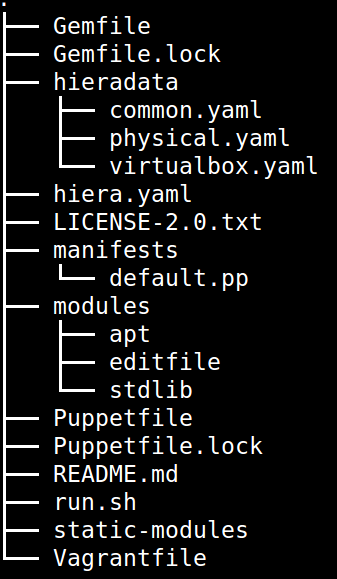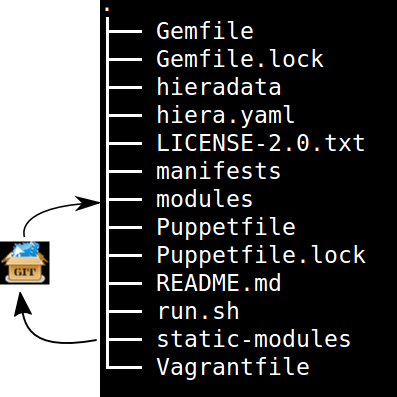 # Intro
Opskelaton is an opinionated bootstrap tool for local Sandbox projects.
Opsk aims to solve the following common issues:
* Devops develop Puppet modules on master machines which results with 'It works on my (machine) master' approach.
* Implicit/Missing dependencies, like ruby version used, operating system, gems, third party puppet module
* Manual steps in setting up puppet modules and local sandboxes (like installing third party code).
* Non standard layout, projects missing README and LICENSE files, no clear seperation between developed and depdendant code.
* No clear development guidelines, for example extracting general modules and exporting them.
See it in action [here](https://www.youtube.com/watch?v=LNlHC54Ej8c).
Usage
=========
```bash
$ opsk generate name box-type
```
## Layout
Opskelaton creates the complete folder structure fine tuned to match best practices:
Folder layout:
# Intro
Opskelaton is an opinionated bootstrap tool for local Sandbox projects.
Opsk aims to solve the following common issues:
* Devops develop Puppet modules on master machines which results with 'It works on my (machine) master' approach.
* Implicit/Missing dependencies, like ruby version used, operating system, gems, third party puppet module
* Manual steps in setting up puppet modules and local sandboxes (like installing third party code).
* Non standard layout, projects missing README and LICENSE files, no clear seperation between developed and depdendant code.
* No clear development guidelines, for example extracting general modules and exporting them.
See it in action [here](https://www.youtube.com/watch?v=LNlHC54Ej8c).
Usage
=========
```bash
$ opsk generate name box-type
```
## Layout
Opskelaton creates the complete folder structure fine tuned to match best practices:
Folder layout:
 ## Lifecycle
Opskelaton defines a simple module life cycle:
1. Internal non reusable modules (usually specific to a client site) go under static-modules
2. If we create a general reusable module which is ready for prime time we pull out to a new git repository.
3. The extracted module is added back as a third party (using [librarian-puppet](https://github.com/rodjek/librarian-puppet) module which reside under module folder.
Life cycle scheme:
## Lifecycle
Opskelaton defines a simple module life cycle:
1. Internal non reusable modules (usually specific to a client site) go under static-modules
2. If we create a general reusable module which is ready for prime time we pull out to a new git repository.
3. The extracted module is added back as a third party (using [librarian-puppet](https://github.com/rodjek/librarian-puppet) module which reside under module folder.
Life cycle scheme:

 # Intro
Opskelaton is an opinionated bootstrap tool for local Sandbox projects.
Opsk aims to solve the following common issues:
* Devops develop Puppet modules on master machines which results with 'It works on my (machine) master' approach.
* Implicit/Missing dependencies, like ruby version used, operating system, gems, third party puppet module
* Manual steps in setting up puppet modules and local sandboxes (like installing third party code).
* Non standard layout, projects missing README and LICENSE files, no clear seperation between developed and depdendant code.
* No clear development guidelines, for example extracting general modules and exporting them.
See it in action [here](https://www.youtube.com/watch?v=LNlHC54Ej8c).
Usage
=========
```bash
$ opsk generate name box-type
```
## Layout
Opskelaton creates the complete folder structure fine tuned to match best practices:
Folder layout:
# Intro
Opskelaton is an opinionated bootstrap tool for local Sandbox projects.
Opsk aims to solve the following common issues:
* Devops develop Puppet modules on master machines which results with 'It works on my (machine) master' approach.
* Implicit/Missing dependencies, like ruby version used, operating system, gems, third party puppet module
* Manual steps in setting up puppet modules and local sandboxes (like installing third party code).
* Non standard layout, projects missing README and LICENSE files, no clear seperation between developed and depdendant code.
* No clear development guidelines, for example extracting general modules and exporting them.
See it in action [here](https://www.youtube.com/watch?v=LNlHC54Ej8c).
Usage
=========
```bash
$ opsk generate name box-type
```
## Layout
Opskelaton creates the complete folder structure fine tuned to match best practices:
Folder layout:
 ## Lifecycle
Opskelaton defines a simple module life cycle:
1. Internal non reusable modules (usually specific to a client site) go under static-modules
2. If we create a general reusable module which is ready for prime time we pull out to a new git repository.
3. The extracted module is added back as a third party (using [librarian-puppet](https://github.com/rodjek/librarian-puppet) module which reside under module folder.
Life cycle scheme:
## Lifecycle
Opskelaton defines a simple module life cycle:
1. Internal non reusable modules (usually specific to a client site) go under static-modules
2. If we create a general reusable module which is ready for prime time we pull out to a new git repository.
3. The extracted module is added back as a third party (using [librarian-puppet](https://github.com/rodjek/librarian-puppet) module which reside under module folder.
Life cycle scheme:
